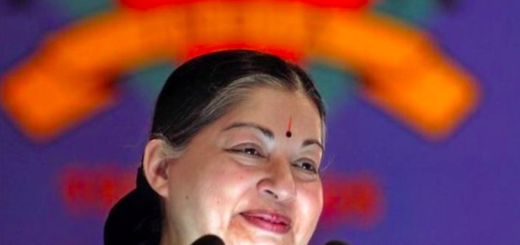“The Writer is Dead”

We Indians have the habit of boasting “India is a land of ahimsa and non-violence”! It is only for public consumption. In reality, we are not what we preach. If there is any index to calculate the intolerance level of people of different countries, we would be among the toppers. At a time when the whole world is united to uphold freedom of expression and speech, we have demonstrated that we are least bothered about it by silencing a Tamil writer, Perumal Murugan, for a ‘mistake’ he committed in 2010 by writing a novel called Madhorubhagan.
The Assault
The writer received numerous abusive and threatening phone calls. The two adjoining towns, Namakkal and Tiruchengode, witnessed provocative posters and violent views in unauthorized public meetings. On December 26, a group of people assembled and burnt copies of Murugan’s novel; they demanded that the book be banned and its author and publisherarrested. Mobs and thugs frequented Murugan’s house to intimidate him. On many occasions, mobs tried to break into his house physically threatening him. There were frequent bandhs and hartals in the town. Finally, on January 8 Perumal Murugan had to flee from his native place, on the advice of police.
Subsequently, under the pressure from pro-Hindu caste outfits, the District administration called for a peace meeting chaired by the Namakkal District Revenue Officer on January 12 in which Perumal Murugan and thirty members from pro-Hindu outfits participated. He was alone and coerced to sign a peace treaty which read: “The author has agreed: a) to issue unconditional apology, b) to delete controversial portions in the book, c) to withdraw unsold copies from market, and d) not to write on controversial subjects hurting sentiments of the people.
Not being able to bear threat and mental agony meted out by the Sangh Parivar, Perumal Murugan declared that “the writer is dead. He is not a God to resurrect, nor does he believe in rebirth. He will live on as an ordinary teacher”. He further said, “Those who had bought Perumal Murugan’s books can burn them if they wish. He is withdrawing all his books and publishers need not sell them anymore. He will compensate them.”
Perumal Murugan pleaded that he should be left alone.He also called upon organisers of literary festivals not to invite him to any events. "As I have decided to withdraw all books, I request caste outfits and religious organization to desist from protests," he said. He has refused to speak to media and press. He is not willing to meet any body. His Facebook is frozen, Twitter account is closed and web page went blank, voluntarily. He has resolutely decided not to write again.
The story –Madhorubhagan
'Madhorubhagan' (One Half Woman) is based on a ritual that was prevalent during pre-Independence era on the occasion of annual car festival of Sri Arthanareeshwarar Temple in Tiruchengode town. Tiruchengode, the abode of Siva in the form of half-woman half-man, is the sacred temple to which childless couple flock to this day hoping to extend their lineage. ‘Mathorubhagan’ is the title of his novel and incidentally the name refers to Lord Shiva in Tamil. As per the ritual, in and around the Temple, childless women could go with any man on the night of the festival. “At the peak of the celebration, all rules were relaxed. The night bore witness to that. Any consenting man and woman could have sex. In the narrow lanes, on the field around the village, in the rest stops on the hill, and on the open surfaces of the rocks, bodies lay casually intertwined. Darkness cast a mask on every face.” A child born out of such a relation was treated as a gift of God.
This night is meant to end many couple's suffering and humiliation. The yesteryear temple car festival sanctioned consensual sex between any man and woman in an attempt to give couples a chance of having children. This practice of consensual sex outside the marriage is not alien to Hindu culture, though it is no more practiced now. Classical Hindu tradition refers to this practice as niyoga or niyoga dharma which implies that it had religious sanction. “Niyoga is the relation indulged in by a childless widow with the brother or any near kinsman of her deceased husband to raise issue.” As we have become more civilized, we have stopped this practice and it is frowned upon now; but not so, hundred years ago. It enjoyed sanction of the society and religion. This is the bone of contention for the Hindutva and caste groups.
The bookMadhorubhaganwas first published in 2010 and now it is into fourth edition. Protests seem to have been triggered only after the English translation 'One Part Woman' was published by Penguin in 2014. ‘Why only now?’ is the question hanging on everybody’s mind? It is said that a fringe group functioning from New Delhi is orchestrating the entire sequence of events. They have lab-tested and succeeded in many parts of northern India, including Gujarat, in jeopardizing communal harmony. Now the same brigade wants to experiment it in Tamil Nadu.
The unholy alliance
Dharma has time dimension. Dharma is subjective as it depends on who is governing the state. Protest is manufactured, not spontaneous to establish dharma. You protest only when it is conducive and you are confident of taking to streets that nothing will happen to you. The ruling establishment, instead of protecting the ‘freedom of speech and expression’ of an individual, has connived with caste outfits in intimidating an author and intellectual who has contributed enormously to the Tamil literature of the Kongu region.
Perumal Murugan is not just a novelist. He is a professor of Tamil language and literature, and a strong advocate of social justice. He wrote against the unethical practice of producing ‘mark scoring machines’ in Kongu region. This region specializes in schools that produce state ranks and high scoring students. These schools are run on a business model that charge exorbitant fee which only the wealthy can afford. Murugan came down heavily on those whoare a dominant-business community here. It is this vested interest group that has joined hands with Hindutva elements, who want to have a strong foothold in Tamilnadu.There is an unholy alliance of caste group and religion which is dangerous.
Freedom of Expression
‘Freedom of expression and speech’ is not free from stress. Now and then it is put to test and challenged. M.F Husain was forced to leave India and live in exile due to constant threat posed by Hindutva elements. Tasleema Nasreen is leading a life of secrecy as she faces ‘fatwas’ issued by Muslim fundamentalists. Salman Rushdie went into hiding to escape the wrath of the extremists. Kamal Hasan thought seriously of quitting film industry and leave India when screening of his film ‘Vishwaroopam’ was contested. Narendra Dabholkar was killed for speaking against superstition.
There are many instances like these where ‘freedom of expression and speech’ is challenged. The right to freedom of speech and expression guaranteed in Article 19 (1) (a) is not absolute. It is subject to certain restrictions like preserving public order, decency and morality. When it is violated, there is always legal remedy which is inbuilt in the constitution. It is always up to the court to decide when the Article 19 (1) (a) is misused. A small group of people purportedly assuming the role of guardianship of Hindu tradition and culture has no locus standi to represent the entire Hindu population. They are not the true representatives of Hindu majority. It is a case of minority ruling the majority.
The argument put forth by these groups is that ‘it affects the sentiments’ of the people. They invoke ‘religious sentiments’ as the reason to further their hidden agenda of converting India into a Hindu nation. They have started the political process of destroying pluralism and diversity and promoting homogeneity of one culture, one language and one religion. In their scheme of things there is no space for minority to assert their identity and rights guaranteed by the constitution. For them, minority simply ‘do not exist’. They live in fools’ paradise of treating India as their own country and it belongs to them only. Not rational, not reasonable and not logical!
Creative artists like Perumal Murugan dive deep into the history and bring to light certain practices that existed which otherwise would never come to light. It is always fascinating to see the cultural practices of bygone era dug out and put in proper perspective for public consumption and critical analysis. These creative models are the ones that appeal to the imagination of common folk and sustain our interest in culture and history. Sadly, this has been picked up for political mileage crucifying the creative writer in Perumal Murugan.
(The writer is an Associate Professor at the St. Joseph’s College in Trichy)
– See more at: http://www.indiancurrents.org/detailedarticle.php?d=343#sthash.5V4Vjwsx.dpuf
















